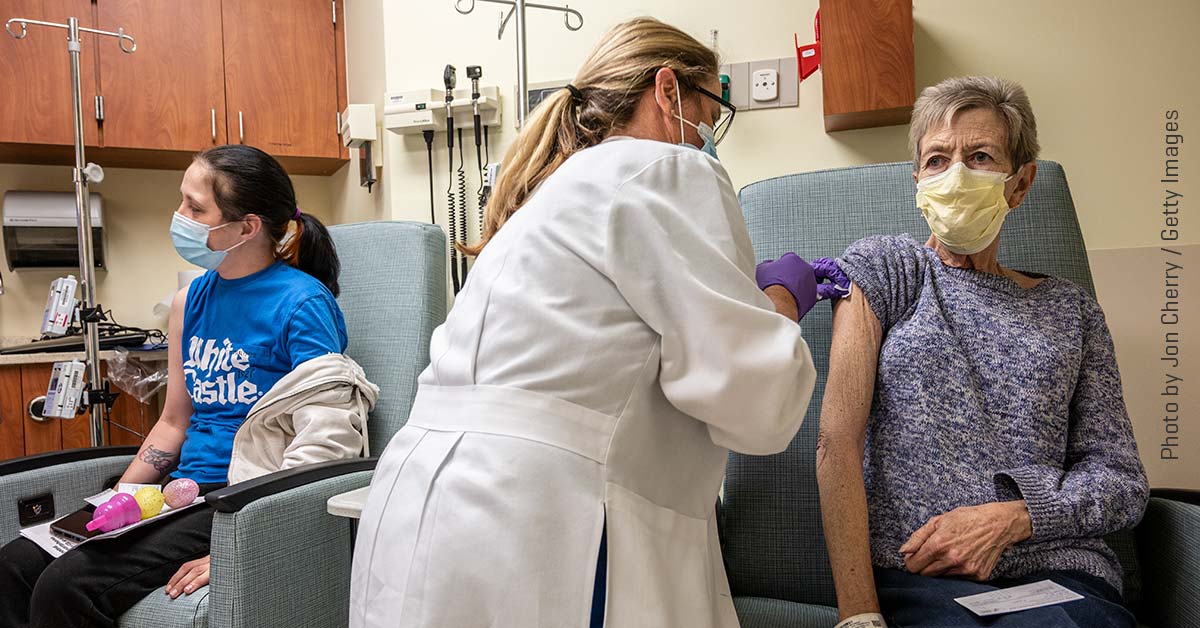
Infected? Fast action, testing help
Those who do become infected have options, too, specifically the antiviral oral drug Paxlovid, which should be given within five days of symptoms to help prevent COVID from progressing to more serious illness.
But it comes with some risks and side effects.
“Paxlovid is often difficult to use in immunocompromised and other medically complicated patients due to drug-drug interactions or organ dysfunction, such as kidney failure,” Pergam said.
Additionally, reports of rebound infections after a single five-day course of Paxlovid have prompted the FDA to ask the drug maker, Pfizer, to look at testing a second round in patients who rebound.
Other monoclonal antibody therapies are also available for those who are infected. The important thing, Pergam said, is that if you have symptoms — whether immunocompromised or not — don’t wait to seek help.
“Get tested right away,” he said. “And if you’re positive, talk to your doctor about possible treatment options. Early treatment is key in preventing major complications.”
Even if you’re not having symptoms, you still might want to test if you know you’ve been exposed or spent time in a higher risk environment.
According to a recent JAMA Network Open study that looked at 210 patients and employees at a Los Angeles health center (most of whom had received mRNA vaccines), more than half of the people infected with COVID-19’s omicron variant didn’t know it because they were asymptomatic.
“Unawareness may be a highly prevalent factor associated with rapid person-to-person transmission within communities,” the researchers concluded.
So, if you’re planning on spending time with cancer patients or other immunocompromised people, test first. Home tests are still easily available.
Focus on the vulnerable
Immunocompromised people make up around 3% of the population in the U.S., somewhere between 7 and nearly 10 million individuals dealing with what Pergam calls "a wide swath of diseases, complications and medical therapies.”
Cancer patients with blood cancers and people who’ve had solid organ transplants are highly immune suppressed, he said, and should be the most cautious. Those with a more moderate risk include solid tumor patients (think breast, colon, prostate, lung, etc.) who are currently in treatment as well as rheumatoid arthritis patients taking biologic agents. Low-risk groups, he said, would be those who take low-dose steroids, say, for asthma.
“But we don’t have great tools to say, ‘Here’s where you fit in,’” he stressed. “There are not hard and fast rules.”
And even though cancer patients and other vulnerable folks number in the millions, the COVID-19 response has not directed special efforts toward protecting them.
“There’s not been a focus from public health on immunocompromised or cancer patients,” Pergam said. “We have resources in terms of the availability of Evusheld, but it’s not well advertised or well publicized. There are no messages on radio or TV about it. They’ve basically focused on hospitals and systems to tell immunosuppressed people ‘You’re eligible, come get this.’”
Liu believes public health officials should be more concerned about those at risk — and not just because it’s our moral duty as a society. It’s also a key step in controlling the spread of the pandemic.
“There’s a need to recognize that this population is at high risk, and at risk for having prolonged infection which can give rise to additional variants,” she said. “Investing in ways to optimize protection and treatment of the immunocompromised is indicated even if they represent a small portion of the population. This could have a significant impact on the course of this pandemic and I don’t think that’s been really understood.”
Pergam said part of the problem is perception.
“You think it’s just the bald person in a bed with an IV drip who’s very sick but that’s not what immunosuppression is,” he said. “Immunosuppressed people look like us; they walk around with us. The person bagging your groceries may look normal but could be at deathly risk.”
The Link LonkAugust 26, 2022 at 01:29AM
https://www.fredhutch.org/en/news/center-news/2022/08/covid-19-complacency---a-hard-shift-for-the-immunocompromised-.html
COVID-19 complacency: 'A hard shift for the immunocompromised' - Fred Hutch News Service
https://news.google.com/search?q=hard&hl=en-US&gl=US&ceid=US:en
No comments:
Post a Comment